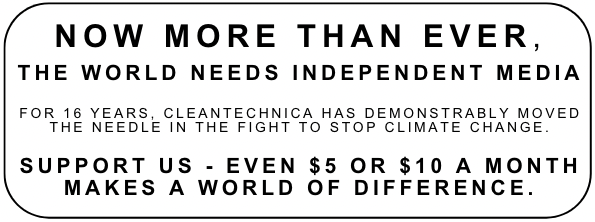
Sign up for daily news updates from CleanTechnica on email. Or follow us on Google News!
The new year is usually a time for us to resolve to do better, to make decisions that are healthy and lead to personal and collective satisfaction and growth. This year is a bit different, though, with an oligarchy ready to pursue anti-climate goals once it’s ensconced in the US executive office.
Once-and-future President Donald J. Trump’s mantra of “drill, baby, drill” has led to little doubt that he’ll appease his financial backers by boosting fossil fuel production and reversing climate policies and regulations aimed at reducing US carbon emissions. As energy attorney Arnab Datta writes in the New York Times, the incoming administration is “not just hostile to the energy transition –” the US will withdraw again from Paris climate agreement, stifle numerous pollution regulations, and promote domestic fossil fuel production — “decisions likely to worsen global warming.”
Should we despair? Should we refuse to read the headlines, foreboding as they are with scenarios of spewing oil wells and dismantled offshore wind farms? Or should we check our frustration at the door and plod ahead, drawing upon a knowledge of intelligence to empower everyday local people to work together on climate action?
Like all things complex, the climate crisis needs multifaceted solutions. Achieving a net zero future means cutting GHG emissions to near zero, with any remaining emissions re-absorbed from the atmosphere by oceans and forests and other natural means. But the climate crisis and the energy transition are not simply environmental or political issues. No, they’re much more.
The need to switch to renewables is at the core of everyday life. Fear of change due to the climate crisis leaves many people lost. Many people recognize the need to make systemic changes to the way we power our homes, businesses, and vehicles, yet they’re largely unwilling to alter their own lifestyles to support such essential clean energy end results. For instance, state leaders are fighting fear mongering as they attempt to reduce transportation emissions in their states, which exacerbates what social scientist Dennis Everberg has termed a “terrain of struggles.”
Climate scientists have no doubt that humans have caused the devastating environmental impacts we see around us. Many climate leaders are recentering their messaging on people who have been disproportionately affected by such environmental harms or climate disasters.
Experts say that, as climate-related problems grow, so will the number of people experiencing unsettling psychological patterns. People react emotionally to the threats inherent in the climate crisis, expressing themselves variously in frustration, anger, or inertia. The International Science Council has long concluded that “overlooking the affective dimension of climate change is not only problematic on an abstract, theoretical level. It also directly impairs our ability to develop new ways of relating to the world.”
In essence, we all need to navigate emotions resulting from climate effects and to develop new affective sensibilities.
The systemic change that is required to convert our homes and businesses to non-carbon emitting power sources strikes at habitus — the way people of particular background perceive and respond to the world. Social conditions that emerge from the climate crisis clearly spark struggles in local communities. Social–ecological transformations and sustainable daily conditions become muddled due to the diversity of opinions, dispositions, and attitudes people hold about the climate crisis and need to reject burning fossil fuels. The founder of 350.org and co-founder of Third Act, climate activist Bill McKibben told the New York Times that their efforts intend to highlight the push for change at the community and state level. McKibben admitted these were “uncharted waters.”
The role of emotions in accelerating the transition to clean energy is often overlooked. It’s time to respect the emotions people are feeling when confronted with climate issues and to recognize that many people often lack the skills to manage these emotions.
Climate activists have a powerful role to play here. In order to help to avert further impact on our economy and our communities, climate activists need to resolve to step back and reflect on our past acts of persuasion. We all-too-often fail to engage people effectively, especially when trying to address something as powerfully emotional as reimagining the way we power our lives. We need to resolve to open ourselves up to vulnerable places so that, even without personally experiencing a natural disaster and being emotionally tossed by local post-storm politics, for example, we seek out paths to compromise. We must not redirect, deflect, or distance ourselves when confronted with climate apathy. Instead, we must resolve to find within us empathy, so that we connect more intensely with people whose habitus diverges from us but who share the common desires of clean air and water, thriving ecosystems and biodiversity, and healthy bodies.
Daniel Golman, an expert on emotional intelligence, suggests that younger people feel climate anxiety more strongly than older generations, as they’ll be dealing with this catastrophe over the course of their lifetimes. He reminds us that everyone’s attention is “under siege these days, between multi-tasking, following social media, and whatever other demands life makes of us.” Golman also says that we should not “underestimate the human capacity for adapting.”
With this frame of reference, climate activists can help individuals confused by the intersection of extreme weather and fossil fuels to think more clearly, adapt to new challenges, stay positive, and work together to answer specific climate-based challenges. Climate activists like us can resolve to highlight the emotional gifts inherent in new laws that have brought about the expansion of solar, wind, and other energy technologies to reduce emissions. Policymakers have switched strategies, moving away from treating climate change as a moral crusade against fossil fuel villains; now they treat it as a problem of technological innovation and industrial strategy. Driving investment to red states wasn’t an electoral strategy: energy attorney Datta writes, “The aim was to create durable economic incentives that would survive political transitions. When decarbonization becomes good business, it becomes harder to dismantle climate progress.”
As part of emotional intelligence awareness, climate activists can concede that clean energy must continue to drop in price and become more plentiful if it is to dominate fossil fuels in the marketplace. Political alliances among seemingly disparate thinkers can result from compromise and find new energy to mobilize sufficient symbolic and material power around climate action.

Chip in a few dollars a month to help support independent cleantech coverage that helps to accelerate the cleantech revolution!
Have a tip for CleanTechnica? Want to advertise? Want to suggest a guest for our CleanTech Talk podcast? Contact us here.
Sign up for our daily newsletter for 15 new cleantech stories a day. Or sign up for our weekly one if daily is too frequent.
CleanTechnica uses affiliate links. See our policy here.
CleanTechnica’s Comment Policy




